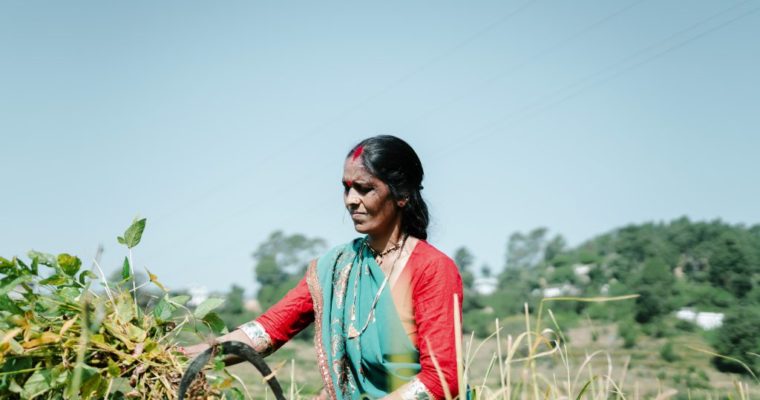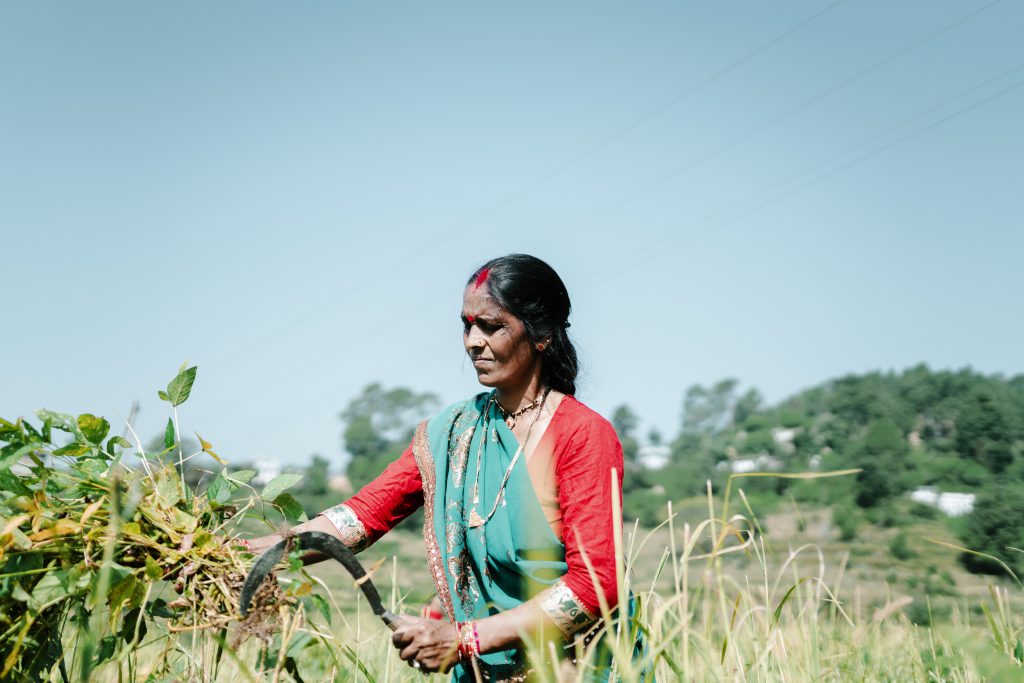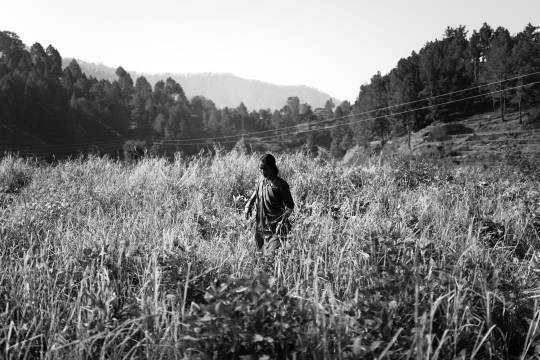This article has been written by Reemaben Nanavaty of the Self Employed Women’s Association (sewa.org) for the grassroots Hindi newsletter, Anusuya.
Farmers have been protesting at the national capital for over a month now, a build-up from local protests that started back in August. On Kisan Diwas, protesting farmers met with water cannons and barricades at the Singhu Border, but they remained entrenched in their positions – determined to only back down once the new Farm Laws had been repealed. We look at the issues raised here by the protesters, investigate where women farmers lie in this political debate and propose what has worked for us at SEWA.
Today farming is the only major occupation of the country. So far our country has adopted policies and laws which have kept agriculture safe. Farmers are not exploited, foreign companies have not been able to destroy the typical traits of agriculture in our country with their seeds, fertilizers, capital, nor have they been able to make money at the cost of farmers.
In this epidemic of 2020, if there was one trade we could rely upon, it was agriculture. Even the workers who had migrated to the cities to earn livelihoods returned to their native places during the lockdown – with the only hope that at least agriculture or farm labor will be available if not anything else – and they will manage to survive. Working under harsh environmental conditions, worsening because of climate change, they produced grains to keep an entire nation fed. In the midst of this pandemic, in June the central government of India brought in two new agriculture Acts and amended an existing one.
It is important to note that the common practice is to amend/make law taking into confidence those impacted by the law- the ‘stakeholders’: discussing with them, listening to their opinions, and framing law keeping them in mind. No such procedure was adopted before passing these Agriculture laws, and they were made public only after they were brought in through Ordinance.
Farmers were shocked. On the one hand, due to lockdown, transportation and markets were closed, the economy was in free fall. On the other hand, there were natural disasters. In the midst of all this, instead of discussing and thinking about strengthening the farmer and making agriculture sustainable, drastic reforms had been brought in, with little heed to what the farmer themselves thought. Much has been written about these laws so here we quickly summarise the key issues, as relevant to the farmers we work with at SEWA.
The first reform is the privatization of what is known as APMC – The Agricultural Produce Market Committee: the elimination of Minimum Support Price. This means that the farmer can now sell her produce anywhere: any private company, trader, or commercial farmer.
Another legislation that supports this is the opening up of contract farming. Together, both these Acts support privatization. With this amendment, any private company or individual can get into a contract with the farmers and purchase directly from them.
At first glance, according to the semantics, it seems that this is in the interest of the farmer. With the amendment of both the laws, the farmers are no longer bound to sell in APMC. They can sell wherever they get the highest price to whomsoever gives her/him the highest price. Additionally, under these laws she won’t have to pay for seeds, fertilizers, tillage, etc. under contract farming, thus reforming the nature of debt in farming, releasing small farmers from becoming debtors.
All this is in an ideal situation. However, the reality of our country’s agriculture and farmers is something different. Where is the farmer’s bargaining power, that s/he can take advantage of the privatization? What is the power of the small and marginal farmer of our country compared to the huge capital investments of big traders and large corporations? Neither do our farmers have the holding capacity nor do they have so much surplus production. Frequently they suffer from the effects of climate change, affecting their meager production. The farmers do not even have the power to bargain in the market for the price. That is why multinational and national large companies have benefited from contract farming for the last few years. Even with regards to the Minimum Support Price declared by the Governments – the maximum benefits of the MSP are taken up by large farmers only.
Additionally, our country has so far preserved rich diversity in agriculture. Vegetables, grains, pulses, cash crops are all grown altogether by a farmer, of all different varieties. This diversity is natural. Contract farming will destroy these agro-ecological and diverse farming practices. The company will provide the type of seeds it needs. The traditional diversity of India will disappear. Farmers will become laborers on the land they have tilled for generations, with no say on the future of farming.
This is further compounded by the feminisation of agriculture. In most of these states, farming is being taken care of more and more by women farmers or the elders of the family. Youth have been forced to migrate to cities to earn a living. The size of landholdings is small. That is why the family cultivates only for the family – it is “family farming”.
Now let us look at the third law, which has been amended – The Essential Commodities Act, which gives freedom to corporations to store many more essential commodities. At present Food Corporation of India is the one that stores the maximum. At number two are the traders who are into Export-Import. The current amendments to the law will encourage investors to make investments in the purchase and storage of grains. This will result in large scale industrial hoarding to ensure maximum profits for the investors. Foodgrains will become increasingly expensive and we may have to even import to meet our public need to ensure that our people don’t starve.
In a nutshell, what is the capacity of the smallholder farmers viz a viz the capitalists?
Farmers need to be organized to take advantage of the reforms in the law- especially small – marginal farmers. If they are organized then only the contract can be negotiated in the interest of the farmers: wherein risks are covered by the agreement; where there is the provision that the price is determined jointly; the farmer has the legal ability to fight any dispute if need be. In addition to the quantity mentioned in the contract, the additional produce can be sold by the farmer anywhere or where s/he may get higher prices – in such cases, it will benefit farmers.
Furthermore, instead of reforms and privatizing, we should be asking how family farming can be strengthened. The core question for us needs to be: How can farming be made sustainable? We propose that each farm becomes an enterprise: a Farm-enterprise, where along with agriculture, there is an integrated localized supply chain of agro-processing and renewable energy, with full technology integrated, including digital. In SEWA we have many examples- “RUDI”, the company, in which the owners and the managers are the farmers and RUDI sisters only. “Ekta” is the Women’s Producer Company in Uttarakhand. “Reva” in Madhya Pradesh.
This is exactly what Elaben calls “Anubandh.” Instead of prioritizing capitalism in agriculture, it is necessary to create structures and local supply chains that link the local farmer – the producer- with the consumer. Procurement is done locally. Every village has a grain bank. Every village has a seed bank. Farmers grow groundnuts, sesame, mustard. The same farmer also has small oil mills, and the oil is sold locally. Similarly, pulses can be converted into Dal; wheat and millets make flour, from which is prepared Bread, Biscuit, Sev, etc. This is sold locally. What a huge potential to create employment! The village money remains and rotates in the village only. Every person can live with self-esteem and dignity.
I am convinced that this will inevitably reduce unemployment in India. Every youth then will adopt agriculture with self-esteem. If this requires a change in legislation, then so be it.






Comments are closed